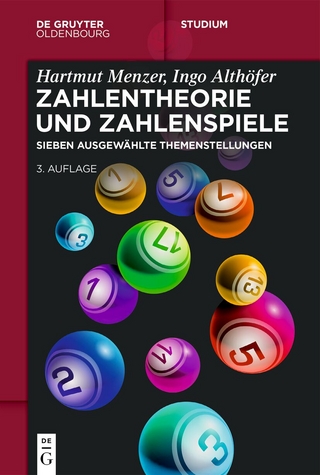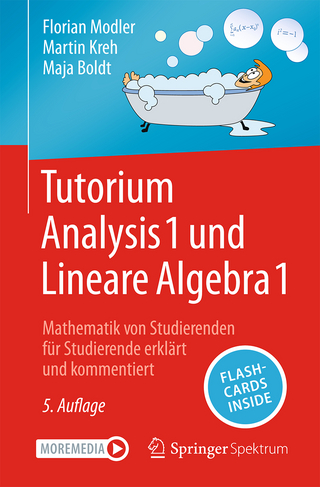
Elementary Algebra For College Students
Pearson (Verlag)
978-0-321-86806-0 (ISBN)
- Titel erscheint in neuer Auflage
- Artikel merken
Through many successful editions, the Angel team has developed a text that students can read, understand, and enjoy. They’ve done this by pairing clear explanations (in short sentences!) with detailed examples and thorough exercise sets.
This program provides a better teaching and learning experience for you and your students. Here’s how:
MyMathLab® improves results with a new video lecture series and a new downloadable Student Workbook that can be packaged with the text and/or the MyMathLab code.
Carefully crafted exercise sets give students the practice they need to build understanding.
Clear, visual presentation gives students content in a readable, easy-to-understand format.
Note: You are purchasing a standalone product; MyMathLab does not come packaged with this content. MyMathLab is not a self-paced technology and should only be purchased when required by an instructor. If you would like to purchase both the physical text and MyMathLab, search for:
0321922638 / 9780321922632 Elementary Algebra For College Students Plus NEW MyMathLab with Pearson eText -- Access Card Package
Package consists of
0321431308 / 9780321431301 MyMathLab -- Glue-in Access Card
0321654064 / 9780321654069 MyMathLab Inside Star Sticker
0321868064 / 9780321868060 Elementary Algebra For College Students
Allen R. Angel received his AAS in Electrical Technology from New York City Community College. He then received his BS in Physics and his MS in Mathematics from SUNY at New Paltz, and he took additional graduate work at Rutgers University. He is Professor Emeritus at Monroe Community College in Rochester, New York where he served for many years as the chair of the Mathematics Department. He also served as the Assistant Director of the National Science Foundation Summer Institutes at Rutgers University from 1967—73. He served as the President of the New York State Mathematics Association of Two Year Colleges (NYSMATYC) and the Northeast Vice President of the American Mathematics Association of Two Year Colleges (AMATYC). He is the recipient of many awards including a number of NISOD Excellence in Teaching Awards, NYSMATYC's Outstanding Contributions to Mathematics Education Award, and AMATYC's President Award. Allen enjoy tennis, worldwide travel, and visiting with his children and granddaughter. Dennis Runde received his BS and MS in mathematics from the University of Wisconsin–Platteville and Milwaukee, respectively. He has a PhD in Mathematics Education from the University of South Florida. He has been teaching for twenty years at State College of Florida, Manatee, and Sarasota Counties and for ten years at Saint Stephen's Episcopal School. Besides coaching little league baseball, his other interests include history, politics, fishing, canoeing, and cooking. He and his wife Kristin stay busy keeping up with their three sons—Alex, Nick, and Max.
1. Real Numbers
1.1 Study Skills for Success in Mathematics
1.2 Problem Solving
1.3 Fractions
1.4 The Real Number System
1.5 Inequalities and Absolute Value
1.6 Addition of Real Numbers
1.7 Subtraction of Real Numbers
1.8 Multiplication and Division of Real Numbers
1.9 Exponents, Parentheses, and the Order of Operations
1.10 Properties of the Real Number System
2. Solving Linear Equations and Inequalities
2.1 Combining Like Terms
2.2 The Addition Property of Equality
2.3 The Multiplication Property of Equality
2.4 Solving Linear Equations with a Variable on Only One Side of the Equation
2.5 Solving Linear Equations with the Variable on Both Sides of the Equation
2.6 Formulas
2.7 Ratios and Proportions
2.8 Inequalities in One Variable
3. Applications of Algebra
3.1 Changing Application Problems into Equations
3.2 Solving Application Problems
3.3 Geometric Problems
3.4 Motion, Money, and Mixture Problems
4. Exponents and Polynomials
4.1 Exponents
4.2 Negative Exponents
4.3 Scientific Notation
4.4 Addition and Subtraction of Polynomials
4.5 Multiplication of Polynomials
4.6 Division of Polynomials
5. Factoring
5.1 Factoring a Monomial from a Polynomial
5.2 Factoring by Grouping
5.3 Factoring Trinomials of the Form ax2 + bx + c, a = 1
5.4 Factoring Trinomials of the Form ax2 + bx + c, a ≠ 1
5.5 Special Factoring Formulas and a General Review of Factoring
5.6 Solving Quadratic Equations Using Factoring
5.7 Applications of Quadratic Equations
6. Rational Expressions and Equations
6.1 Simplifying Rational Expressions
6.2 Multiplication and Division of Rational Expressions
6.3 Addition and Subtraction of Rational Expressions with a Common Denominator and Finding the Least Common Denominator
6.4 Addition and Subtraction of Rational Expressions
6.5 Complex Fractions
6.6 Solving Rational Equations
6.7 Rational Equations: Applications and Problem Solving
6.8 Variation
7. Graphing Linear Equations
7.1 The Cartesian Coordinate System and Linear Equations in Two Variables
7.2 Graphing Linear Equations
7.3 Slope of a Line
7.4 Slope-Intercept and Point-Slope Forms of a Linear Equation
7.5 Graphing Linear Inequalities
7.6 Functions
8. Systems of Linear Equations
8.1 Solving Systems of Equations Graphically
8.2 Solving Systems of Equations by Substitution
8.3 Solving Systems of Equations by the Addition Method
8.4 Systems of Equations: Applications and Problem Solving
8.5 Solving Systems of Linear Inequalities
9. Roots and Radicals
9.1 Evaluating Square Roots
9.2 Simplifying Square Roots
9.3 Adding, Subtracting, and Multiplying Square Roots
9.4 Dividing Square Roots
9.5 Solving Radical Equations
9.6 Radicals: Applications and Problem Solving
9.7 Higher Roots and Rational Exponents
10. Quadratic Equations
10.1 The Square Root Property
10.2 Solving Quadratic Equations by Completing the Square
10.3 Solving Quadratic Equations by the Quadratic Formula
10.4 Graphing Quadratic Equations
10.5 Complex Numbers
Appendix A: Review of Decimals and Percent
Appendix B: Geometry
| Erscheint lt. Verlag | 24.3.2014 |
|---|---|
| Sprache | englisch |
| Maße | 10 x 10 mm |
| Gewicht | 1524 g |
| Themenwelt | Mathematik / Informatik ► Mathematik ► Algebra |
| ISBN-10 | 0-321-86806-4 / 0321868064 |
| ISBN-13 | 978-0-321-86806-0 / 9780321868060 |
| Zustand | Neuware |
| Informationen gemäß Produktsicherheitsverordnung (GPSR) | |
| Haben Sie eine Frage zum Produkt? |
aus dem Bereich



